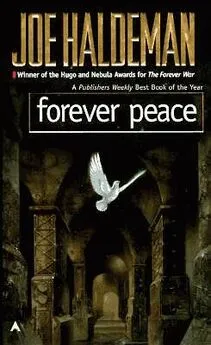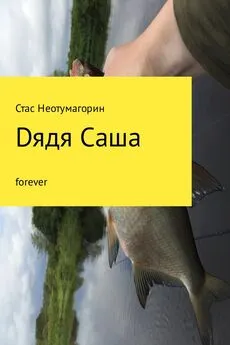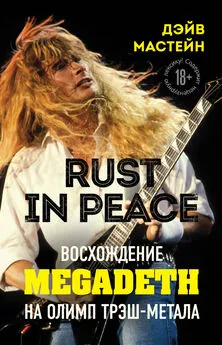Joe Haldeman - Forever Peace
- Название:Forever Peace
- Автор:
- Жанр:
- Издательство:неизвестно
- Год:неизвестен
- ISBN:нет данных
- Рейтинг:
- Избранное:Добавить в избранное
-
Отзывы:
-
Ваша оценка:
Joe Haldeman - Forever Peace краткое содержание
Copyright © Joe Haldeman 1997
Version 1.0
1998 Hugo Award Winner
1999 Nebula Award Winner
This novel is for two editors: John W. Campbell, who rejected a story because he thought it was absurd to write about American women who fight and die in combat, and Ben Bova, who didn't.
Caveat lector: This book is not a continuation of my 1975 novel The Forever War. From the author's point of view it is a kind of sequel, though, examining some of that novel's problems from an angle that didn't exist twenty years ago.
Forever Peace - читать онлайн бесплатно полную версию (весь текст целиком)
Интервал:
Закладка:
"Let's try to do this quietly," I said. "Drop into the coffee plantation about here." I pointed mentally to a spot almost two kilometers downhill from the town. "Candi and I'll work up through the plantation to the rear of Senora Madero's house. See whether we can make the snatch without raising any fuss."
"Julian, you ought to take at least two more," Claude said. "The place is gonna be wired and 'trapped."
I gave him a nonverbal rebuttal: You know I considered that. "Just you be ready to charge up if something happens. We start making noise, I want all ten of you to run up the hill in a tight formation and circle Candi and me. We'll keep Madero protected. Lay down smoke and we head straight down the valley here and then up this little rise for a cargo snatch." I felt the flyboy relay that information laterally and, in a second, confirm that we could have a warm-body snatch in place.
"Now," I said, and all twelve of us were falling fast through the cold night air. We spaced ourselves fifty meters apart and after a minute the black chutes whispered out and we drifted invisibly down into the acres of low coffee trees-bushes, actually; a person of even normal height would have a hard time hiding out there. It was a calculated risk. If we'd landed closer to town, in the actual forest, we would have made a lot of noise.
It was easy to aim between the neat rows. I sank up to my knees in the soft wet soil. The chutes detached and folded and rolled themselves into tight cylinders that quietly fused into solid bricks. They'd probably wind up as part of a wall or fence.
Everybody moved silently to the tree line and took cover, while Candi and I worked uphill, weaving quietly between trees, avoiding brush.
"Dog," she said, and we froze. From where I was, slightly behind her, I couldn't see it, but through her sensors smelled the fur and breath and then saw the IR blob. It woke up and I heard the beginning of a growl that ended with the "thap" of a tranquilizer dart. It was a human dose; I hoped it wouldn't kill the dog.
Just past the dog was the neatly trimmed lawn behind Madero's house. There was a light on in the kitchen – worse luck. The house had been dark when we jumped.
Candi and I could just hear two voices through the closed window. The conversation was too fast and too heavily accented for either of us to follow, but the tone was clear-Senora Madero and some man were anxious, whispering urgently.
Expecting company, Candi thought.
Now, I thought. In four steps, Candi was at the window and I was at the back door. She smashed the window with one hand and fired two darts with the other. I pulled the door off its hinges and stepped into a storm of gunfire.
Two people with assault rifles. I tranked them both and stepped toward the kitchen. An alarm whooped three times before I could track down the relay clicking and rip it out of the wall.
Two people, three people running down the stairs. Smoke and VA, I thought to myself and Candi, and dropped two grenades in the hall. Using vomiting agent was a little tricky, since our snatch was unconscious; we couldn't let her inhale it and possibly choke on her own puke. But we had to work fast anyhow.
Two people were slumped over the kitchen table. There was a circuit-breaker box on the wall; I smashed it and everything went dark, though for Candi and me it was bright red figures in a dark red kitchen.
I picked up Madero and her companion and started back for the hall. But along with the sounds of gagging and retching I heard the greased-metal "snick-chk" of a weapon being armed, and the snap of a safety switch. I flashed an image to Candi and she stuck one arm through the window and swept half the wall down. The roof sagged with a creak and then a splintering crash, but by then I was in the backyard with my two guests. I dropped the man and cradled Madero like a baby.
"Wait for the others," I vocalized unnecessarily. We could hear townsfolk running down the gravel road toward the house, but our people were moving faster.
Ten black giants exploded out of the forest behind us. Smoke there there there, I thought. Lights on. White smoke welled up in a semicircle around us and became an opaque blinding wall with our sunlights. I turned my back on it, shielding Madero from the random chatter of gunfire and laser stab and sweep. Everyone VA and split! Eleven canisters of vomiting agent popped; I was already in the woods and running. Bullets hummed and rustled harmlessly overhead. As I ran I checked her pulse and respiration, normal under the circumstances, and checked the dart site on the back of her neck. The dart had fallen out and she'd already stopped bleeding.
Leave the note?
Candi thought, Yes: on the table somewhere under the roof now. We had a supposedly legal warrant for Senora Madero's detainment. That and a hundred pesos would get you a cup of coffee, if there was any left after export.
Out of the forest, I could run faster. It was exhilarating, bounding over the rows of low coffee bushes, even though in some corner of my mind I always knew I was lying inert a hundred miles away, inside an armored plastic shell. I could hear the others running just behind me and, as I moved up the hill toward the pickup, the faint hiss and snap of the approaching chopper and fly-boys.
When it's just us soldierboys they snatch us at speed; we hold up our arms and grab the bail as it sails by. For a warm-body snatch, though, they have to actually land the helicopter, which is why she had two flyboys as escorts.
I got to the top of the hill and broadcasted a bleep, which the helicopter returned. The rest of the platoon came loping up in twos and threes. It occurred to me that I should have called for two choppers; do a regular snatch on the other eleven. It was dangerous for all of us to stand out in the open for any length of time, with the helicopter noise attracting attention.
As if in answer to my concern, a mortar round hit fifty meters to my left, orange flash and muted thump. I linked with the flyboy in the chopper and sensed a short argument she had with Command. Someone wanted us to drop the body and do a regular snatch. As the flyboy came over the horizon, another mortar round hit, maybe ten meters behind me, and we got the modified order: line up for a regular snatch and she would come in as slowly as practical.
We got together in file with our left arms up, and I had one second to wonder whether I should hold Madero tightly or loosely. I opted for tight, and most of the others agreed, which might have been wrong.
The bail snatched us with an impulse shock of fifteen or twenty gees. Nothing to a soldierboy but, we found out later, it cracked four of the woman's ribs. She woke up with a shriek as two mortar rounds hit close enough to hole the chopper and damage Claude and Karen. Madero wasn't hit by the shrapnel, but she found herself dozens of meters off the ground and rising fast, and she struggled hard, beating at me and screaming, writhing around. All I could do was hold her more tightly, but my arm had her pinned just below the breasts, and I was afraid to press her too hard.
Suddenly she went slack, fainting or dead. I couldn't check her pulse or respiration, hands full, but there was not much I could have done in any case, other than not drop her.
After a few minutes we landed on a bald hill, and I confirmed that she was still breathing. I carried her inside the helicopter and strapped her into a stretcher that was clamped to the wall. Command asked whether there were any handcuffs, which I thought was kind of amusing; but then she elaborated: this woman was a true believer. If she woke up and found herself in an enemy helicopter, she would jump out or otherwise do away with herself.
The rebels told each other horror stories about what we did to prisoners to make them talk. It was all nonsense. Why bother to torture someone when all you have to do is put her under, drill a hole in her skull, and jack her? That way she can't lie.
Of course, international law is not clear on the practice. The Ngumi call it a violation of basic human rights; we call it humane questioning. The fact that one of ten winds up dead or brain-dead makes the morality of it pretty clear to me. But then we only do it to prisoners who refuse to cooperate.
I found a roll of duct tape and bound her wrists together and then taped loops around her chest and knees, fixing her to the stretcher.
She woke up while I was doing her knees. "You are monsters," she said in clear English.
"We come by it naturally, Senora. Born of man and woman."
"A monster and a philosopher."
The helicopter roared into life and we sprang off the hill. I had a fraction of a second's warning, and so was able to brace myself. It was unexpected but logical: what difference did it make whether I was inside the vehicle or hanging on outside?
After a minute we settled into a quieter, steady progress. "Can I get you some water?"
"Please. And a painkiller."
There was a toilet aft, with a drinking water tap and tiny paper cups. I brought her two and held them to her lips.
"No painkillers until we land, I'm afraid." I could knock her out with another trank, but that would complicate her medical situation. "Where do you hurt?"
"Chest. Chest and neck. Could you take this damned tape off? I'm not going anywhere."
I cleared it with Command and a foot-long razor-keen bayonet snicked into my hand. She shrank away, as much as her bonds would allow. "Just a knife." I cut the tape around her chest and knees and helped her to a sitting position. I queried the flyboy and she confirmed that the woman was apparently unarmed, so I freed her hands and feet.
"May I use that toilet?"
"Sure." When she stood up she doubled over in pain, clutching her side.
"Here." I couldn't stand upright in the seven-foot-high cargo area, either, so we shuffled aft, a bent-over giant helping a bent-over dwarf. I helped her with her belt and trousers.
"Please," she said. "Be a gentleman."
I turned my back on her but of course could still see her. "I can't be a gentleman," I said. "I'm five women and five men, working together."
"So that's true? You make women fight?"
"You don't fight, Senora?"
"I protect my land and my people." If I hadn't been looking at her I would have misinterpreted the strong emotion in her voice. I saw her hand flick into a breast pocket and caught her wrist just before her hand made it to her mouth.
I forced her fingers open and took a small white pill. It had an odor of bitter almonds, low-tech.
"That wouldn't do any good," I said. "We'd just revive you and you'd be sick."
"You kill people and, when it pleases you, you bring them back from the dead. But you are not monsters."
I put the pill in a pocket on my leg and watched her carefully. "If we were monsters we would bring them back to life, extract our information, and kill them again."
"You don't do that."
"We have more than eight thousand of your people in prison, awaiting repatriation after the war. It would be easier to kill them, wouldn't it?"
"Concentration camps." She stood and pulled up her trousers, and sat back down.
"A loaded term. There are camps where the Costa Rican prisoners of war are concentrated. With UN and Red Cross observers, making sure they're not mistreated. As you'll see with your own eyes." I don't often defend Alliance policies. But it was interesting to watch a fanatic at work.
"I should live that long."
"If you want to, you will. I don't know how many more pills you have." I linked through the flyboy to Command and brought a speech analyzer on line.
"That was the only one," she said, as I'd expected, and the analyzer said she was telling the truth. I relaxed slightly. "So I'll be one of your prisoners of war."
Читать дальшеИнтервал:
Закладка:









